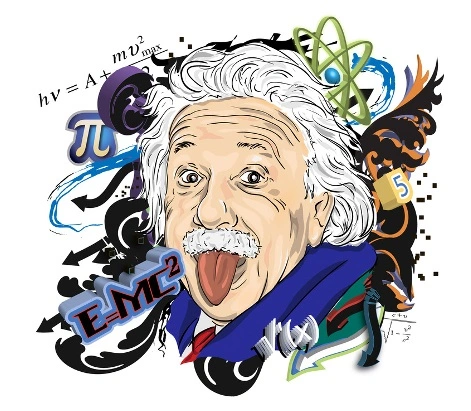Einstein, Albert
Publié le 22/02/2012

Extrait du document

Einstein, Albert (1879–1955) world
famous and highly influential
expatriate German scientist
The most famous scientist of his time and the most
important physicist since Isaac Newton, Albert
Einstein created the simple equation, E = mc2 that
not only demonstrated the equivalence of matter
and energy, but showed the tremendous quantity
of energy inherent in the atomic nucleus. The
insight, provided mainly by Leo Szilard, that such
energy might be liberated was the theoretical basis
for the atomic bomb. While Einstein did not participate
directly in the war effort, the letter Szilard
persuaded him to compose and send to President
Franklin D. Roosevelt on August 2, 1939,
prompted Roosevelt to authorize what quickly
became the Manhattan Project, the all-outAmerican effort to create an atomic weapon before
the Axis powers (especially Germany) could do the
same.
Einstein was born in Ulm, Germany, in 1879
and moved with his family the following year to
Munich. Young Einstein did not respond well to
the strict and unimaginative German schools, but
fared better in Swiss schools. He graduated in physics
and mathematics from the Federal Polytechnic
Academy in Zürich in 1900. He became a Swiss
citizen, taught mathematics very briefly, then
worked as a patents examiner in Bern. In 1905,
Einstein published "A New Determination of
Molecular Dimensions," which earned him a Ph.D.
from the University of Zürich. This same year saw
the publication of papers including "On a Heuristic
Viewpoint Concerning the Production and
Transformation of Light," which formed the basis
for quantum theory; "On the Electrodynamics of
Moving Bodies," which postulated the epoch-making
special theory of relativity; and "Does the Inertia
of a Body Depend Upon Its Energy Content?"
which established the equivalence of mass and
energy, expressing this in the equation E = mc2.
Einstein was catapulted to prominence among
physicists and became in 1912 a professor at the
Polytechnic in Zürich. In 1914, Einstein became
associated with the Prussian Academy of Sciences
and lectured at the University of Berlin. He published
"Foundation of the General Theory of Relativity"
in 1916, arguing that gravitation is not a
force, as Newton held, but a curved field in what
Einstein called the space-time continuum.
While Einstein was revolutionizing the field of
physics, he was also becoming a social and political
activist, with an increasing commitment to pacifism,
and he used his growing international fame as
a scientist to publicize his social and political views.
A Jew, Einstein toured the United States in spring
1921 to raise money for the Zionist Palestine Foundation
Fund. He was treated as a great celebrity in
the United States and conceived an affection for the
country. This same year, he was awarded the Nobel
Prize for Physics. Yet the heyday of Einstein's theoretical
innovations was over. During the later 1920s
and 1930s, he devoted as much time to the cause of
pacifism as he did to science. In 1933, after Adolf
Hitler became chancellor, Einstein left Germany
and accepted appointment to the faculty of the
Institute for Advanced Study in Princeton, New
Jersey. He lived in Princeton for the next two
decades.
In 1939, the great Danish physicist Niels Bohr
told Einstein that the German physicist Lise Meitner
had split the uranium atom, resulting in the
conversion of its mass into energy. It was a practical
demonstration of Einstein's 1905 theory. Bohr
shared with Einstein his speculation that a controlled
chain reaction splitting of uranium atoms
could produce an explosion far greater than any
conventional chemical explosive could create. The
Hungarian expatriate physicist Leo Szilard, coming
to this same conclusion and fearing that German
scientists would produce a nuclear weapon for Hitler,
persuaded Einstein to write a letter to President
Franklin D. Roosevelt urging "watchfulness and, if
necessary, quick action on the part of the Administration."
Einstein wrote:
In the course of the last four months it has been
made probable—through the work of Joliot in
France as well as Fermi and Szilard in America—
that it may become possible to set up a nuclear
chain reaction in a large mass of uranium, by
which vast amounts of power and large quantities
of new radium-like elements would be generated.
Now it appears almost certain that this
could be achieved in the immediate future.
This new phenomena would also lead to
the construction of bombs, and it is conceivable—
though much less certain—that extremely
powerful bombs of a new type may thus be
constructed.
Einstein suggested that the president "may think it
desirable to have some permanent contact maintained
between the administration and the group of
physicists working on chain reactions in America,"
and he concluded the letter on an ominous note: "I
understand that Germany has actually stopped the
sale of uranium from the Czechoslovakian mines
which she has taken over. That she should have
taken such an early action might perhaps be understood
on the ground that the son of the German Under-Secretary of State, von Weizsacker, is attached
to the Kaiser-Wilhelm-Institute in Berlin where
some of the American work on uranium is now
being repeated." Such was Einstein's prestige that
Roosevelt almost immediately authorized what
soon became the Manhattan Project.
Einstein played no actual role in the creation of
the atomic bomb, but his letter provided the impetus
for the undertaking. After its use on Hiroshima
and Nagasaki, Einstein became an eloquent voice
in the quest for ways to prevent any future use of
atomic weapons. He was listened to politely but
largely ignored by statesmen and politicians.
Liens utiles
- COMMENT JE VOIS LE MONDE, Albert Einstein (résumé)
- Le problème du rapport théorie-expérience - Albert Einstein
- Albert Einstein par Louis de Broglie de l'Académie française et de l'Académie des Sciences.
- Allemand d'origine, Albert Einstein changea deux fois de nationalité.
- Albert Einstein - ciencia y tecnologia.
